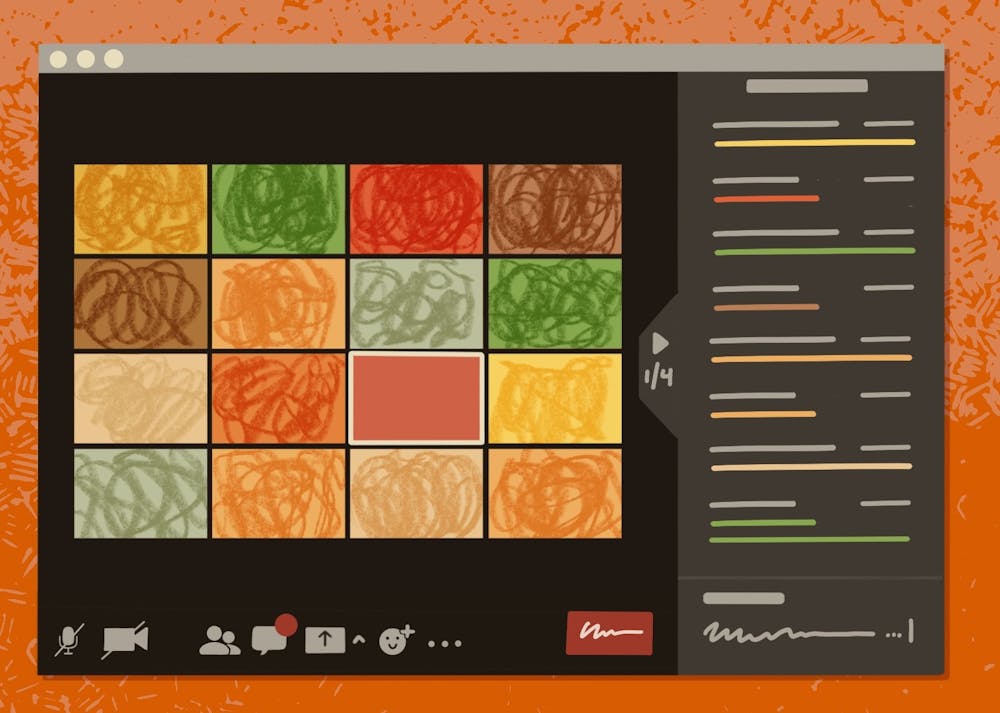The basics of Zoom etiquette seem simple at first, but a year into remote learning, students and faculty realize Zoom courtesy is much more than just showing up.
With the University continuing its hybrid ASU Sync model this spring, students and faculty have come up with their own tips to help make learning through Zoom as smooth as possible: Don't forget when you're unmuted, don't spam the chat, try to keep the camera on and more.
Though every class is different, these tips can help both students and professors make the most of every virtual learning experience.
To make Zoom work, students and faculty need to understand it
In order to improve life on Zoom, it's important to understand it first, said Scotty Craig, a human systems engineering associate professor at ASU and eLearning expert.
"We have to look at the affordances that we have, which means: 'What does Zoom give us? And what can we do to make it better?'" Craig said.
One of the interactions that can become blurred or even completely erased is the lack of nonverbal communication, especially when students' cameras are off, Craig said. Simple gestures like head nods and facial expressions are thrown completely out of the picture.
"It's natural for humans to pick that up," he said. "But it's not quite as natural in Zoom, for example, when you have a class of 20 people and you don't see anybody."
This absence of communication makes lecture-based courses one of the most difficult to conduct over Zoom.
Though common in college classes, lectures don't always translate best over Zoom and can limit collaboration, said ASU lecturer Prescott Perez-Fox.
Perez-Fox specializes in graphic, branding and web design and was the technological editor for the guide "Zoom for Dummies."
"I think there's a lot of instructors who are using Zoom essentially as a broadcast; a one-way mechanism," Perez-Fox said. By doing so, he said, professors risk "missing the chance for interactivity."
Craig said professors need to be sure they equally pay attention to in-person students and those over Zoom in hybrid classes.
"It can be very easy if an instructor does not stay focused, to ignore the online students in favor of the in-person students," Craig said. "It's almost never a conscious decision."
To combat this, Craig said professors should check in with their online students every time they take questions or talk to the students in front of them in the room.
Being online presents new opportunities to learn
Craig said the benefit of remote instruction is the chance for professors to break the molds of traditional learning and try new methods. "Lectures have to be done differently," he said.
Craig, for example, restructured his lectures around "microlearning," or dividing content into shorter, more manageable units. Zoom features such as breakout rooms make this especially easy, he said.
Another opportunity arises when students are free to explore a subject with the internet at their fingertips.
Remote learning puts students in the unique position of taking control of their education, a term Craig said is "student agency."
"Students can take back power because we're no longer tied to these physical rooms anymore," Craig said. "You really do have the entire internet at your disposal."
Encouraging students to do so, he said, helps build a "more dynamic, more interactive class, and I think it helps to build those social connections that you lose because students aren't seeing each other."
It's important to be mindful of the class situation
Diego Escalante, a junior studying software engineering who posted common tips for Zoom classes on Reddit, shared a few tips of his own.
One of his top pet peeves was turning on the camera to be greeted with dark screens. "I don't want me to be on full display to a bunch of like, blank names," Escalante said.
If students do turn on their cameras, it's important to come prepared for class just as one would if it were in-person, Perez-Fox said.
Being mindful about the mute button is important, too, to avoid distracting background noise, he said.
READ MORE: Finding a middle ground on Zoom etiquette
Though staying muted is considered common courtesy, there are also times when speaking up is encouraged.
Shyanne Henderson, a sophomore studying preveterinary medicine, gave the example of breakout room discussions, where speaking up and collaborating is in everyone's best interest.
"It's really hard to get the point across through Zoom," Henderson said, therefore, it's important for students to talk out problems to better understand them, especially when labs are remote because it is more important than ever to help each other.
"Labs really help you understand the information," Henderson said. "I had such a hard time learning the information, and our professors struggled a little bit (through Zoom)."
Above all, during such tumultuous times, the best students and faculty can do is be flexible and understanding.
Perez-Fox said working from home with family can sometimes mean students might have an unexpected classmate from time to time, and it's important to make clear to students situations like that are fine.
"Most people are at home, so I say if a pet or a child appears, not only should you not apologize, but actually, you must introduce us — we have to see the dog," Perez-Fox said. "There have been situations where I'm in the middle of talking and I'll just spotlight somebody's dog."
Craig highlighted the importance of instructors being understanding of their students' situations and not being quick to assume the student doesn't want to participate.
"We have to be aware of and accepting, as instructors, when you're in this Zoom setting, that these things happen," Craig said. "It may not be that they don't care, it's probably that life is happening. So it's important to check-in and be more flexible with students."
Reach the reporter at sreyes23@asu.edu and follow @r_salma_ on Twitter.
Like The State Press on Facebook and follow @statepress on Twitter.
Continue supporting student journalism and donate to The State Press today.




